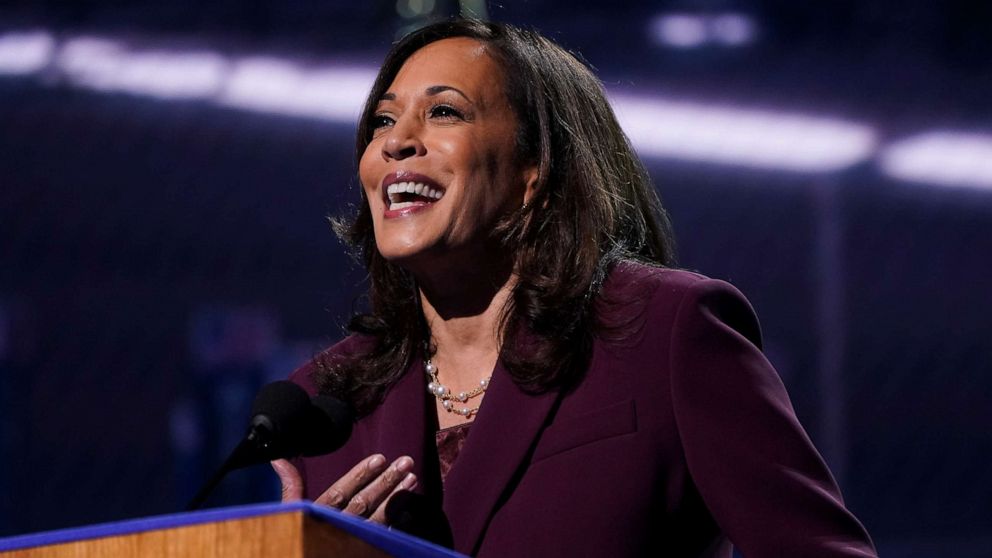And so it came to pass in a procession of speeches steeped in historical consciousness that, one hundred years and one day after the ratification of the Nineteenth Amendment, which guaranteed women the right to vote, two women who had reached the heights of elected officialdom and the first Black president set the stage for the first woman of color to occupy a spot on a presidential ticket.
These speakers and others faced the twin challenge of commemorating the moment while advancing the strategic imperative of stimulating sufficient turnout over the weeks ahead to win the election. Voting begins in just five weeks. I listened and watched for rhetorical pivots, hinges, and levers from history to action.
The two women, Hillary Clinton and Nancy Pelosi, were consigned to the end of the 9 pm hour to close a segment on women in politics. Each of them made the pivot through direct appeals to vote. So did other speakers. Oddly, while they asked viewers to text VOTE to 30330, the screen never displayed the number.
***
Former President Obama was introduced via a clip of his awarding Joe Biden the Presidential Medal of Freedom, with distinction at the end of their second term. Biden bent with emotion and Obama embraced the man he called his brother. But as the live Obama began the tenor shifted abruptly. He was in the Museum of the American Revolution in Philadelphia. The words “Writing the Constitution” appeared behind him in red block letters; a spray of flowers sat to his left. Were we at a history lecture or a funeral?
We were at a lecture bent on preventing a funeral. “It is not a normal time,” Obama began. And this was not a normal passing-the-torch convention speech. Obama was stern. The lilting register he often uses to inspire was absent. No witticisms lay ahead.
The former president opened by speaking with reverence about the Constitution, “a North Star that would guide future generations.” Across the lifespan of the republic Americans have improved the document and made the country better. A president should, as its only nationally elective officer, feel the responsibility of acting as the custodian of the democracy the Constitution structures.
Obama recalled how he hoped that his successor would come to feel the weight of the office, but that he never did. The four count indictment that followed would not make difficult homework for a student looking to substantiate any of the charges:
For close to four years now, he’s shown no interest in putting in the work, no interest in finding common ground, no interest in using the awesome power of his office to help anyone but himself and his friends, no interest in treating the presidency as anything but one more reality show that he can use to get the attention he craves.
Due to these abandonments of Constitutional responsibility, Obama said, Americans have lost 170,000 lives and millions of jobs “while those at the top take in more than ever.”
Later in the speech Obama cited Trump for “using law enforcement as political pawns” and averting “facts and science and logic” while “just making stuff up.” He broadened the indictment to the entire administration in accusing it of a willingness to “tear our democracy down if that’s what it takes for them to win.”
Before those last trio of accusations Obama extolled Biden and Harris and outlined their agenda. His last point on their behalf returned to his main theme:
more than anything, what I know about Joe and Kamala is that they actually care about every American. And they care deeply about this democracy.
Obama then spoke directly to young voters. He urged them to embrace their civic responsibility and arrived at his pivot. He understood, he said,
why a young person might look at politics right now, the circus of it all, the meanness and the lies and crazy conspiracy theories and think, what’s the point?
Well, here’s the point: this president and those in power — those who benefit from keeping things the way they are — they are counting on your cynicism.
In the strongest passage of the speech Obama elaborated that malevolent reckoning and beseeched those dwelling in cynicism to not let Trump take away “your power, your democracy.” Make a plan to vote. “What we do echoes through generations.”
Obama held young Americans up to the standards of their predecessors, who had put their bodies and lives on the line for democracy. And he praised them for their protests.
You are this country’s dreams fulfilled. You can give our democracy new meaning, take us to a better place. Stay safe, God bless.
***
Kamala Harris was nominated by declaration. Smart move: this was too somber a night for another rollicking roll call of the states, which would have been repetitive to boot. A video featured Harris’s sister, step-daughter, and niece talking about her devotion to their family. Other women narrated her bio. Then Harris appeared, alone but for a scattering of photographers and reporters, in a cavernous hall in Wilmington, with a podium and flags and state banners on columns. Behind that no back wall could be seen.
A lengthy prologue cited by name some of the women who had brought the nation and her to this juncture. “We’re not often taught their stories,” she said. “But as Americans, we all stand on their shoulders.”
Harris spoke about her immediate family and national sorority, and settled into a retelling of her mother’s story. Like Obama, she invoked the memory of John Lewis in describing her “stroller-eye view” of the protests her mother and father brought her to. In a subtle response to growing accusations about her citizenship she noted that her immigrant mother gave birth to her at Kaiser Hospital in Oakland, California. Harris then accepted the nomination in her mother’s honor, and committed herself to the vision of the “beloved community.” The phrase and the idealistic public philosophy it articulates traces back to another Californian, Josiah Royce; Martin Luther King Jr. brought it into the civil rights movement. The “beloved community” evokes
A country where we may not agree on every detail, but we are united by the fundamental belief that every human being is of infinite worth, deserving of compassion, dignity and respect.
A country where we look out for one another, where we rise and fall as one, where we face our challenges and celebrate our triumphs — together.
“Today,” Harris continued, “that country feels distant” because Trump’s failure of leadership has cost lives and livelihoods. She concluded a brief comparison of the coronavirus with structural racism with what will be the most quoted line from this speech: “There is no vaccine for racism.” Consequently, “we gotta do the work.”
That’s the line Biden spoke to her on the video-recorded call where he asked her to join the ticket. She left that tacit as she segued into her praise segment for him. And she too, like Obama and for that matter countless orators, concluded with a “for the children and their children” call to action.
This was not a great speech. It was a compilation of material Harris used while campaigning for the presidential nomination. The Biden stories are getting worn, and now that Harris has been formally re-introduced to a large audience one hopes fresher material is on the way. Still, something less than greatness befits the assumption of what is, for all its historical significance, a supporting role. And Harris delivered it with warmth, affection, purpose, and that striking philosophical invocation.

